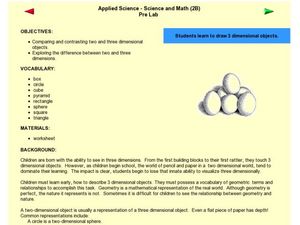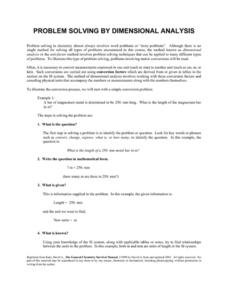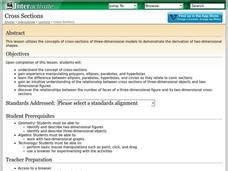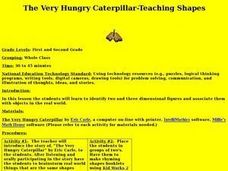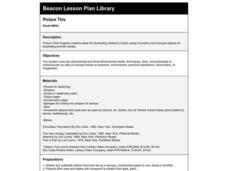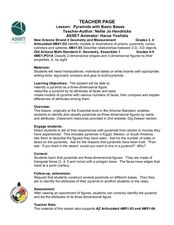Curated OER
Draw 3 Dimensional Objects
Bring three-dimensional shapes to life in your classroom. First introduce the vocabulary of three-dimensional shapes, such as sphere, cube, and pyramid. Then, show your kids examples of how to use two-dimensional objects draw...
Curated OER
Three- and Two- Dimensional Geometry
In this three- and two- dimensional geometry worksheet, 7th graders solve 12 various problems related to geometric shapes and measurement. They first use paper and a pencil to sketch the front, side, back, top and bottom views of each...
Curated OER
Two-Dimensional Drawings from Three Dimensional Objects
Sixth graders identify and replicate two dimensional illustrations of three dimensional objects. In this spatial visualization lesson, 6th graders practice viewing objects from various sides. Student participate in stations to view...
Curated OER
Seeing in 3D: Interpreting Two-Dimensional Diagrams of Three-Dimensional Objects
Students hone in on their skills at reading diagrams. In this dimensional lesson students collect information on the functions of organs then figure out how all the parts work together.
Chymist
Problem Solving by Dimensional Analysis
Is your class in another dimension with regards to dimensional analysis? Give them some extra practice with a straightforward activity. Learners convert units by following concise step-wise examples, including setting up the problems....
Shodor Education Foundation
Cross Sections
Use this activity on cross-sections of three-dimensional shapes in your math class to work on algebra or geometry Common Core standards. The instructional activity includes a list of relevent terminology, and a step-by-step process to...
Curated OER
Dimensional Analysis Practice Problems
In this science and engineering worksheet, students use dimensional analysis to solve each of the problems stated on the sheet. They illustrate their work and how they arrived at their answers by using significant figures for their final...
Curated OER
The Very Hungry Caterpillar - Teaching Shapes
Students identify two- and three-dimensional figures and associate them with real-world objects. In this geometry lesson, students are read The Very Hungry Caterpillar by Eric Carle and complete several activities including a chart of...
Space Awareness
What is a Constellation
Why do some stars in a constellation appear brighter than others? Using a get-up-and-move astronomy activity, scholars explore perspective and the appearance of constellations in the sky while developing an understanding of the...
National Geographic
Mapping the Shape of Everest
With Mount Everest as the motivator, your earth science class learns about topographic maps. Begin by showing a film clip from The Wildest Dream: Conquest of Everest, featuring fearsome virtual imagery of a path up world's tallest peak....
Curated OER
Calculating Distances in Two and Three Dimensions
Students use the Pythagorean Theorem to solve problems. In this geometry lesson, students solve for the distances by calculating the different parts of the shape of a two and three dimensional shape. They reason by analogy.
Sargent Art
Facial Proportion Challenge: Freaky Faces
Young artists have fun making freaky faces when they accept the challenge of making proportional portraits. They must find pictures in magazines, cut out two eyes, a nose, and a mouth, and then rescale these images into a portrait.
Curated OER
Tall Tales Folded Envelope Book
Students create a book using art, problem solving and language skills. They illustrate and write a tall tale. They sculpt a character from their tall tale.
Curated OER
Drawing Into the Imagination
Sixth graders create a non linear story with multiple possibilities and endings. In this non linear story lesson plan, 6th graders research non linear stories, create their own, and illustrate it.
Curated OER
The Art of Illustrator Eric Carle
First graders use two-dimensional and three-dimensional media and techniques to communicate ideas, experiences, and stories in works of art. They use media and tools in a safe and responsible manner
Curated OER
Geo Jammin' - Day 2, Lesson 6: Rhyme and Reason
Students listen to the poem "Shapes" by Shel Silverstein in order to accurately and specifically describe shapes' rules/traits in their journals. They illustrate the poem and take turns reading during a creative shared reading session.
Curated OER
Math 212: Planes
In this plane worksheet, students find the midpoint of a line, determine points on a plane, and use the cross product to find an equation with given parameters. This two-page worksheet contains three problems.
Curated OER
Introducing Powers and Models
Students construct two dimensional models to illustrate squared numbers. For this geometry lesson, students use graph paper and an x/y axis to build squares exponentially. Students identify powers and relationships between various...
Curated OER
Using 2 and 3 Dimensional Geometric Shapes
Students explore geometry by participating in a shape identification activity. In this figure dimensions lesson, students identify the difference between 2 and 3 dimensional shapes by their vertices and faces. Students examine blocks in...
Curated OER
Learn the Shapes
Students examine and identify the similarities and differences of two-dimensional shapes. They play an I-Spy shape game, participate in a classroom Shape Search, and create illustrations of shapes for a shape collage.
Curated OER
Picture This
Fourth graders use two-dimensional and three-dimensional media, techniques, tools, and processes to communicate an idea or concept based on research, environment, personal experience, observation, or imagination.
Curated OER
Pyramids with Basic Bases
Students explore pyramids. In this math lesson, students discuss where they have seen examples of pyramids. Students classify pyramids as three-dimensional figures and identify their attributes.
Curated OER
A Model of Three Faults - Part One
Students construct a fault model using the Fault Model Sheet imbedded in this plan. They create a 3 dimensional model of the Earth, and use dashed lines to illustrate where the fault lies. A discussion of faults follows the completion of...
NTTI
Transform Your Geometry into a Work of Art
Mathematicians utilize artwork to help illustrate the major ideas of transformations and tessellations. They visually identify transformations including reflections, rotations, and translations. They discuss how artists have used...


